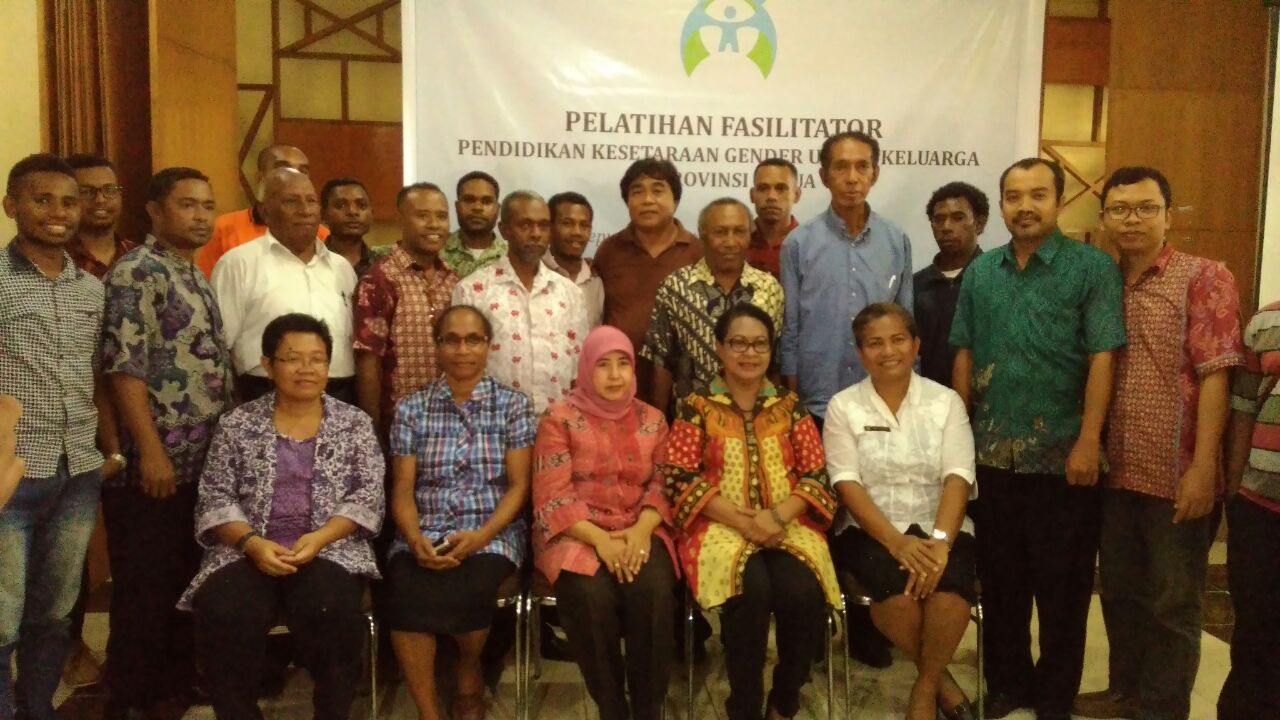Having been successful in Yogyakarta, Training of Facilitator on Gender Equality Education in the Family is now held in Abepura, Jayapura, Papua province, by the Ministry of Women's Empowerment and Child Protection, September 28 to October 4, 2016 with a team of facilitators from Rifka Annisa. Also attended by the Minister of Women's Empowerment and Child Protection, Yohana Yembise, during the opening ceremony of the training.
50 participants attended the training, from church activists, pastors, church administrators, to students. Participants were divided into three groups: fathers, mothers and teenagers. Participants of this training undertook a series of discussions using a community facilitator approach that targets families of married parents and children whom are teenagers.
The team of facilitators from Rifka Annisa invited participants to provide feedback and discuss relationships and gender roles that are evident in their culture. Relationships and gender roles that are fair and equitable in the family will have an impact on the strengthening of healthy, positive, and violence free family values.
Manager of the Research and Training Center Divison at Rifka Annisa, Muhammad Saeroni, explained that the strengthening of the family would greatly benefit the family. Referring to the ecological framework of Rifka Annisa, family resilience is proportional to community resilience and the resilience of a country. "Strengthening families is certainly very necessary to increase their resilience that is expected to have a positive impact on the resilience of its people," said Roni, the nickname of Muhammad Saeroni.
Educations and awareness is one method used to strengthen the family and achieve gender equality. Strengthening families through gender equality in the family education must be relevant to all women, men, and teenagers in the family. The main focus of such education is to increase the knowledge, understanding, and create perspective and behavioural changes related to gender norms and values.
Roni added that gender equality through education in the family, is expected to be ignite healthy communication patterns, healthy parenting, healthy relationships among family members all of which would significantly increase a family’s ability to prevent negative behaviour and decrease the likelihood of violence. When gender equality is already evident within a family, the aim is to change the perceptions of male family members who identify with dominance, strength, and superiority, and in comparison to change the perceptions of women who identify with weakness, inferiority, dependence and so on, so that they, the women, are not at risk of violent conditions.
"This family approach is critical to implement because often gender-based violence is correlated with problems in the family," said Fitri Indra Harjanti, as one of the facilitators of Rifka Annisa. A woman whom is familiar with Fitri also added that through education on gender equality in the family, it is expected to change patterns of healthy communication, healthy parenting, healthy relationships among family members which would all significantly prevent the likelihood of violent incidences in the family.
During the training, in addition to the seminars and discussion and performing simulations in the classroom, the candidates are also encouraged by the facilitators to practice what they have learnt in their own communities and to run similar sessions with members of their local communities.
Translated by: Emma Hardy

Responding to the many questions presented to Rifka Annisa about cases of sexual assault on campus such as the case of sexual harassment occurring in the crowds of UGM as recently reported, Rifka Annisa expressed this statement:
Yogyakarta, June 7, 2016
Suharti